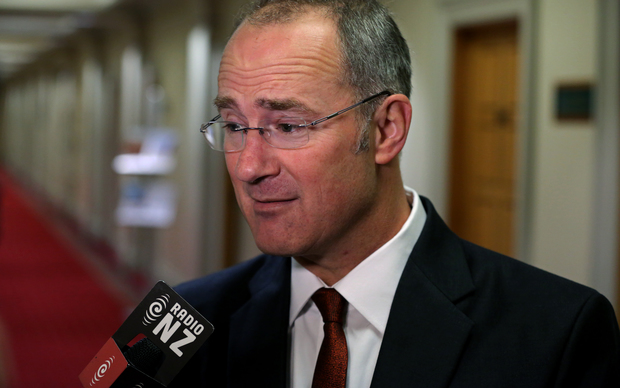 |
| Auckland's boring uniform subdivisions |
For a start, we had three bills were rushed (as usual) through Parliament, and as is normally the case with rushed bills, the issues get raised afterwards, not beforehand. What makes this interesting as that it wasn't just the opposition party in a fit, as usual, but external commissions were having their voices heard as well. That's what I want to talk about today, because I've discovered a whole new world of the select committees, who have helped me to understand a whole new kettle of fish in the parliamentary process that goes unheard of by much of the media, except RNZ's In Parliament podcast. I recommend this to anyone who wants to keep up with political news but also has better things to do. It's great listening as I'm driving or doing housework.
'[The bill] gives ministers unprecedented and extraordinary powers to sell billions worth of public land and housing built up and paid off by generations of New Zealanders through taxes and state-house tenants with the express purpose of putting a roof over the heads of our most vulnerable citizens.... we are utterly opposed to dismantling and privatising that system of housing and social support... This bill is a charter for corruption... It gives [English and Bennett] the power to sell billions of dollars of land and public housing to overseas corporations, to merchants bankers, property speculators.. There is no requirement for them to be not profit, no track record for delivering social housing... Anyone can rock up and say "I'm a community housing provider".'
Phil Twyford
'abject... ideological nonsense [Labour is] caught in a paradigm that says only the state can own a house... when we have community housing providers already in existence.'
Now, this is usual red vs. blue 'Tories are selling our future' vs 'everything will work out fine, you pessimistic commies!' But to much surprise, the Maori Party voted in favour of the bill, with Marama Fox stating:
'This is not a vote for a wholesale sell-off of state houses... we have been asked by Iwi around this country to support this to ensure they can get into the market, because Housing New Zealand have done an appalling job, and they believe they can do it better.'
 |
| Marama Fox |
 |
| 'Yeah nah think we should get the Fulton Hogan boys onto it' |
But moving on past
HNZ, Marama's theory is fine, for all reasons except one: if we're
delegating this to community housing for the benefit of locals, then
why are we not placing any prerequisites for who actually gets to own those homes? Everybody
agrees the purpose of state, municipal and community housing is to
benefit those who cannot get into the housing market. Why, then,
would we not place sanctions preventing speculators who are only
going to raise the prices? It's quite simple: You can only buy this
house if you are an NZ permanent resident, doesn't already own a
home, blah blah blah
Now, I'm not asking
for NZ First level of restrictions here. I'm not asking for racism or xenophobia. If a Chinese investor wants
to buy up a third of the houses in that new subdivision, fine, go ahead, whatever – but
we're not talking about some new flashy subdivision by the beach – we're
talking about state houses. What do we expect, Bill
Gates to buy a new state house and start up a tech company to contribute millions to the local economy? We all know what's going to
happen – these homes are going to get bought up and rented out - often by foreigners (in the sense of foreign to the country, or foreign to the community) and guess what, Maori party: your constituency is going to be more dependent than they
were beforehand. I'm not asking that every home buyer go through some vetting
process, but if we're talking about selling state houses, I think the
bare minimum should be that they are New Zealand residents, or that
only the occupants can buy, with HNZ working with MSD to provide
financial assistance in the form of loans to help them purchase the
houses. Everyone wins. People get to own their own houses, no
speculators raising the prices arbitrarily, and the government doesn't have to do
jack shit but approve the odd loan every now and then. Wouldn't something like this work? Would it really be that hard? I don't know - I won't pretend to be an expert on NZ's housing problems, but I just don't see the logic behind opening up state houses to be purchased by anyone on Planet Earth. That's just me. I'm no xenophobe - I love immigrants and most of my friends are foreigners, but most foreigners in New Zealand agree there should at least be a buyers register. I'd love to bring up the link to that report, but I can't find it. If anyone can, let me know.
Trust Me, I'm Not an Expert
One of the tangible things I dislike about the government (and I won't pretend this doesn't happen with every government) is their arrogant dismissal of people who are more qualified to discuss a topic than they are. Sometimes they pass legislation with such confidence that you feel obliged to trust them if for no other reason - except when it comes to bite them back in the butt when they have commissions and organisations openly expressing doubts and concerns. When the International Whaling Commission (IWC) openly criticised our government for it's actions during the Maui dolphin sanctuary exploitation, the IWC were dismissed by the then conservation minister - Nick Smith (he seems to pop up a lot in this post - he's a little gremlin he is). The point is: when it comes to the subject of marine life, who are you going to believe - the International Whaling Commission, or an engineer/politician who has been in charge of the country's department of conservation for less than a year? Remember, Nick, the IWC devote their entire lives to the subject. You were given your position because of a cabinet reshuffle. You are not a professional - you are a representative, and as such, you are obliged to listen to experts, but you choose otherwise.
Case in point: Earlier this month we had a review of the Residential Tenancies Amendment Bill which requires smoke alarms and insulation in residential rental properties. Sounds good, you say? Well, everyone applauded Nick Smith for passing a 'generally alright bill', but here's the problem: every single person who had anything about it was essentially asking Mr. Smith the same question:
We had Dr. Russell Wills of the Children's Commission appearing before the social services committee, expressing his concerns:
Then you get a fellow politician, the Porirua city mayor telling us:
'We're positive about the changes... but generally this legislation doesn't go far enough. We are confronted as a city with... people living in damp, cold homes and significant health issues. As a council, we are often forced to sit idly by and advocate that there's nothing really practical we can do. The legislative tools we haven place are not effective... We would like to see the development of national standards.'
For The Benefit Of Mr. House
The media does a criminal job of paying as little attention possible to the ongoings of these select committees, yet I find them fascinating to listen to - for once I'm hearing the voices not of robotic politicians loaded with scripted answers to scripted questions - not of the lazy ministers who are so-called 'responsible' for these ministries, but rather I'm hearing the actual key people who operate these agencies and departments. Most of all, we hear the voices of commissions, like that of Russell Wills above. When you hear concerns raised by members of commissions devoted to whatever, whether it be to preventing workplace sexual harassment or ensuring young people aren't getting their hands on Gold Cards, and you have commissions raising concerns, you can respond two ways. You can say
These commissions & committees ideally work for the benefit of the public, yet instead we have to deal with a loud bunch of morons we call our 'representatives' (see above). Why can't we just cut out the middlemen? Cut out the spin? Shouldn't our media be focused more on what happens in those committees? Why not? Our democracy will be better, our government will be better. We will be better. Our intelligence won't be insulted every time we decide to give our elected officials the benefit of the doubt and listen to their nonsense.
It's assumed lefties like me have this impulsive distrust of politicians for the sake of it. The truth is, I don't want to hate my elected officials. I get no joy out of it. I would give anything to live in a country where I can actually trust them to carry on the will of the people. But unfortunately, we do not live in that kind of world.
Trust Me, I'm Not an Expert
 |
| 'I'm a construction engineer - I think I know a thing or two about how dolphins work.' |
One of the tangible things I dislike about the government (and I won't pretend this doesn't happen with every government) is their arrogant dismissal of people who are more qualified to discuss a topic than they are. Sometimes they pass legislation with such confidence that you feel obliged to trust them if for no other reason - except when it comes to bite them back in the butt when they have commissions and organisations openly expressing doubts and concerns. When the International Whaling Commission (IWC) openly criticised our government for it's actions during the Maui dolphin sanctuary exploitation, the IWC were dismissed by the then conservation minister - Nick Smith (he seems to pop up a lot in this post - he's a little gremlin he is). The point is: when it comes to the subject of marine life, who are you going to believe - the International Whaling Commission, or an engineer/politician who has been in charge of the country's department of conservation for less than a year? Remember, Nick, the IWC devote their entire lives to the subject. You were given your position because of a cabinet reshuffle. You are not a professional - you are a representative, and as such, you are obliged to listen to experts, but you choose otherwise.
 |
| 'I have calculated that this water has a high density of liquidization' |
Because if there's one thing worse than a terrible bill, it's an incredibly average bill that only half solves an issue. And no, I'm not joking, because at least a terrible bill acknowledges that it's terrible. A mediocre bill, on the other hand, has the audacity to pretend it's solving the issue, when it really doesn't. Then, when people complain about it some time later, Mr. Smith will say 'hey look, I did this bill I made an effort,'
We had Dr. Russell Wills of the Children's Commission appearing before the social services committee, expressing his concerns:
'In New Zealand we have 42,000 admission of children a year to hospital, with illnesses attributable to poverty - ammonia, athsma, bronchitis,... these deaths and hospitalisations are avoidable if we choose. Minister English and his budget of may 2013 ... we hoped we would see real progress. Government made a promise ... this is not a warrant of fitness. If your rental house is below the 1978 standard, your required to insulate to the current code, however if it is above the 1978 standard, you are not required to upgrade - no further work required.. do we think the 1978 standard is good enough? (There should be) a single standard of insulation, a heating and ventilation standard, and a monitoring for enforcement regime. Surely our children deserve no less.'
 |
| A Porirua home is kinda like living in a public pool: wet, mouldy, dilapidated and state owned. |
'We're positive about the changes... but generally this legislation doesn't go far enough. We are confronted as a city with... people living in damp, cold homes and significant health issues. As a council, we are often forced to sit idly by and advocate that there's nothing really practical we can do. The legislative tools we haven place are not effective... We would like to see the development of national standards.'
The media does a criminal job of paying as little attention possible to the ongoings of these select committees, yet I find them fascinating to listen to - for once I'm hearing the voices not of robotic politicians loaded with scripted answers to scripted questions - not of the lazy ministers who are so-called 'responsible' for these ministries, but rather I'm hearing the actual key people who operate these agencies and departments. Most of all, we hear the voices of commissions, like that of Russell Wills above. When you hear concerns raised by members of commissions devoted to whatever, whether it be to preventing workplace sexual harassment or ensuring young people aren't getting their hands on Gold Cards, and you have commissions raising concerns, you can respond two ways. You can say
- They're raising a legitimate concern
- They're just complaining in order to look useful - they have to complain about issues, even when there are none - otherwise they have no need to exist! What a bunch of idiots
Okay, even if you believe the second bullet to be true, fine, but two points from me. First, I think it's a part of a healthy democracy that we have institutions, not just individual people, actual institutions devoted to raising these concerns with government. Even better if these commissions are experts in their field of knowledge. Here's parliament's actual definition of a select committee (the people the commissions appeal to):
If you're a visual person, imagine the committee as being a high court, and the commissions as members of the public united in some cause (too many kids stealing our gold cards, whatever). After the case is done and the members leave the courtroom, the journalists are waiting outside, snapping their cameras and struggling desperately to get a word out. When we hear whatever bullshit is coming out of parliament, we are like those journalists whose questions are received with the response 'no comment'. Parliament is full so many blatant lies, it is no longer considered abnormal, even when the member is openly caught out, and we wonder why people feel alienated from politics.
It's assumed lefties like me have this impulsive distrust of politicians for the sake of it. The truth is, I don't want to hate my elected officials. I get no joy out of it. I would give anything to live in a country where I can actually trust them to carry on the will of the people. But unfortunately, we do not live in that kind of world.







No comments:
Post a Comment